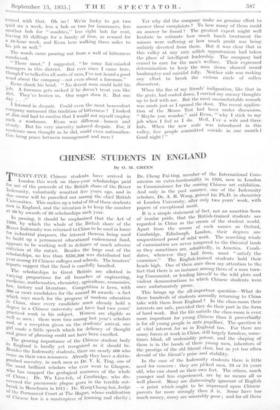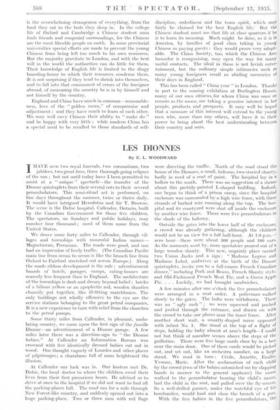CHINESE STUDENTS IN ENGLAND
By 0. M. GREEN TWENTY-FIVE Chinese students have arrived in London this week on three-year scholarships paid for out of the proceeds of the British share of the Boxer Indemnity, voluntarily remitted five years ago, and in due course will be parcelled out among the chief British Universities. This makes up a total of 59 of these students now in England, and the intention is to keep the number at 60 by awards of 20 scholarships each year. To passing, it should be emphasised that the Act of 1930, by which the whole of the British share of the Boxer Indemnity was returned. to China to be used in loans for industrial purposes, the interest thereon being used to build up a permanent educational endowment fund, appears to be working well in defiance of much adverse criticism at the outset. Besides the large cost of the scholarships, no less than $586,500 was distributed last Year among 13 Chinese colleges and schools. The trustees' reports suggest that the fund is carefully handled. The scholarships to Great Britain are allotted in varying proportions for all branches of engineering, Inedieine, mathematics, chemistry, agriculture, economies, law, history and literature. Competition is keen, with 300 or more candidates for the annual 20 awards—a fact which says much for the progress of modern education n already hold a in China, since every candidate must degree in a Chinese university and have had two years' Practical work in his subject. Women are eligible as well as men : there were two among last year's scholars and, at a reception given on the students' arrival, one girl made a little speech which for delicacy of thought and grace of phrasing could not have been excelled. The growing importance of the Chinese student body in England is hardly yet recognised as it should be. Besides the Indemnity students, there are nearly 400 who come on their own resources. Already they have a distin- guished ancestry, in such men as Dr. V. K. Ting, one of the most brilliant scholars Who ever went to Glasgow, who has mapped the geological resources of the whole of China ; Dr. Wu Lien-teh, of Cambridge, who dis- covered the pneumonic plague germ in the terrible out- break in Manchuria in 1911 ; Dr. Wang Chung-hui, Judge of the Permanent Court at The Hague, whose codification of Chinese law is a masterpiece of learning and clarity Dr. Cheng Fai-ting, member .of the International C0111- missiOn on extra-territoriality in 1926, now in London as Commissioner for the coming Chinese art exhibition. And only in the past summer, one of the Indemnity scholars, Dr. A. B. Wang, gained his Ph.D. in chemistry at London University, after only two years' work, with papers of exceptional merit. It is a simple statement of fact, not an assertion born of insular pride, that the British-trained students are regarded in China as the cream of the student world. Apart from the aroma of such names as Oxford, Cambridge, Edinburgh, London, their degrees are unquestioned proof of solid work. The searching winds of examination are never tempered to the Oriental lamb as they sometimes are, admittedly, in America. Candi- dates, wherever they hail from, must " satisfy the examiner." The English-trained students hold their heads high. One of them once drew my attention to the fact that there is no instance amongto the owfiladmpalontstuarond- ing Communist, or lending himself violent demonstrations to which Chinese students were :once unfortunately prone. This question—What do This brings up the these hundreds of students annually returning to China take with them from England ? In the class-room their interests are safe, provided they do their part in the form of hard work. But the life outside the class-room is even more important for young Chinese than it proverbially is for all young people in state pupillari. The question is of vital interest for us in England too. For there are many forces at work in China, still largely formless, some- times blind, all undeniably potent, and the shaping of them is in the hands of these young men, inheritors of the prestige of the old literati class, but as yet too often devoid of the literati's poise and stability.
In the case of the Indemnity students there is little need for concern : they are pLkcd men, 28 or 24 years old, who can stand on their own feet. The others, much younger and less experienced, are by no means all so well placed. Many are distressingly ignorant of English —a point which ought to be impressed upon Chinese parents far more strongly than it is. Some have too much money, many are miserably poor ; and for all there is the overwhelming strangeness of everything,'• from the food they eat to the beds they sleep in. In the college life of Oxford and Cambridge a Chinese student soon finds friends and congenial surroundings, for the Chinese are the most likeable people on earth. In some provincial • universities special efforts are made to prevent the young Chinese from being left too much to his own resources. But the majority gravitate to London, and with the best will in the world the authorities can do little for them. Their knowledge of English life is limited to the dingy boarding-house to which their resources condemn them. It is not surprising if they tend to shrink into themselves, and to fall into that commonest of errors of the foreigner abroad, of measuring the country he is in by himself and not himself by the country.
• England and China have much in common—reasonable- ness, love of the " golden mean," of compromise and adjustment ; and they have much to learn of each other. We may well envy Chinese their ability to " make do " and be happy with very little ; while modern China has a special need to be recalled to those standards of self- diScipIine, orderliness and the team spirit, which tittly • :fairly be claimed for the best English ' But the Chinese' student must see that life at close quarters if he is to learn its meaning. Much -might be &Me, as it is hi 'America, by faniiiies. of good class taking in young Chinese as paying guests.: they would prove very adapt- ;able. The China Society, too, which the Chinese Ani, bassador is reorganising, may open the way for many -useful contacts. The ideal in these is not lavish enter .tainment, but the • ordinary simple intimacies such as .many young foreigners recall as abiding memories of their days in England. - This has been called " China year " in London. Thanks in part to the coming exhibition at Burlington House, many of our own citizens, for whom China was once as remote as the moon, are taking a genuine interest in her peOple, products and prospectS. • It may well be hoped that a measure of this interest will extend to the young • men who, more than any others, will have it in their power to bring about the best understanding between their country and ours.







































 Previous page
Previous page